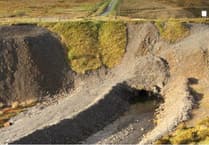More than 10 tonnes of waste have been cleaned up from a three-kilometre stretch of the polluted River Teifi.
Llandysul villagers have expressed their horror after images on social media showed boat loads of debris and agricultural refuse being hauled from the riverbed by tens of volunteers over the last three weekends.
Teams numbering between 20 and 50 people, led by the village’s Paddlers Canoe Centre and Club, took to the water or scoured the riverbanks.
The images have prompted calls for authorities to take action against landowners discarding waste into the river – and be more proactive in cleaning it themselves rather than relying on volunteers.
Residents of the small Ceredigion village helped fill boats, canoes and kayaks with agricultural debris, metal and plastic recovered along the stretch of the much-loved river.
Environmental regulator Natural Resources Wales (NRW) has launched an investigation into the finds.
The canoe club described the amount of waste recovered as an ‘environmental disaster’ after its first clean up – and said its members were ‘lost for words’ after the second.
On Saturday (4 March), it posted: “River clean number three completed.
“Thanks again to all the volunteers who helped, the section today was from Porth Hotel to Llandysul bridge so only 500m.
“Such a shame to see what has been dumped in the river. About three tons in this section taking us over 10 tonnes in just 3km.”
The Teifi’s health has been on the radar of authorities for several years, with nitrate and phosphate pollution a particular concern.
As the Cambrian News reported in November, analysis of environmental regulator Natural Resources Wales' (NRW) figures, shows the Teifi is victim to the most sewage discharges in Wales.
National organisation Canoe Wales sent volunteers to help and said: “There has to be a way of disposing of this waste sustainably and not let it end up in our rivers.
“Canoe Wales was proud to get out and help Llandysul Paddlers clear up a stretch of the Afon Teifi - 30 people on the water and another 20 walking the banks.
“Apart from a few tyres it is all agricultural waste. All bale netting and wrap.
“This not only looks a total mess; it is a danger to all kinds of wildlife.
“We successfully released two Sea Trout smolt that were tangled up in it.”
Robert Winter, a leading member of environmental group Llandysul Biodiversity, told the Cambrian News: “The river is stuffed full of agricultural debris including plastic, twine, metal and heaven knows what chemicals come off the fields.
“Absolutely none of the authorities have taken any responsibility and purely rely on volunteers to clear up.
“This area has abundant wildlife and river birds, all of whom are having to live, eat and survive amongst all this plastic and rubbish.
“NRW has taken a water sample for me after the dead fish incident, so I am looking forward to seeing what that data might say about water quality.
“We believe there are so many chemicals potentially flooding off the fields upstream of Llandysul now mixed with debris, its time the authorities got a grip!”
Dr Carol Fielding, NRW’s Ceredigion Environment Team Leader said: “The scale and range of debris and waste taken from the River Teifi at Llandysul is shocking and the local community has done an excellent job to clean it up.
“We received a pollution incident report following the river clean which emphasised the amount of agricultural material that was collected, and we are investigating the report at present.
“We all have a role to play to make sure waste or other materials don’t end up in our rivers. We encourage everyone to report any sightings of pollution or any environmental incidents to our incident hotline on 03000 65 3000.”
Rachel Auckland from the Ceredigion County Council Biodiversity Team said: “Recently a group of volunteers looked at a 5km section of river Teifi near Llandysul, that they knew had a large amount of rubbish in it but all that attended were in shock at the amount they found.
“The section has obviously had silage wrap and silage netting dumped directly into the river.”
Dangerous levels of harmful phosphates, nitrates and other harmful substances in the Teifi are being closely monitored by authorities after NRW set new targets to reduce levels last year. Ceredigion County Council also set up the Afon Teifi Phosphate Reduction and Mitigation Project (PRAM) which is delayed by months and does not commit to any targets.
Water provider Dwr Cymru and NRW data shows there is approximately 45kg of phosphorous discharged daily in the Teifi, which mostly comes from agricultural output and sewerage plants while sewage overflows only contribute to about three per cent of it.
The state of the river has been deteriorating for so long that many nearby planning applications have been halted while it continues to be monitored.
More than 60 per cent of Wales’ Special Areas of Conservation (SAC) rivers, including the Teifi, are failing against their phosphate target.




